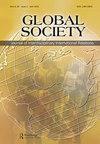“没有人是非法的”——反对递解出境的反向话语
IF 2.3
Q2 INTERNATIONAL RELATIONS
引用次数: 1
摘要
2015年之后,许多欧洲国家的国家当局积极污名化寻求庇护者和无纸化,将他们定义为“非法”。在芬兰,这种非法性话语在多个层面受到非公民和公民主体的抵制。本文考察了“没有人是非法的”运动中提出的论点可以被视为构成福柯式意义上的反向话语的方式,以及它如何在可驱逐性的背景下运作,这种背景维持了结构性不平等和种族化的等级制度,这种等级制度基于嵌入在国家中心主权中的政治排斥/包容逻辑。它展示了国家的非法话语如何促进了社会控制的强大推进,但却促成了一种反向话语的形成,这种话语有助于促进非公民的法律和政治要求。在非公民被国家“取消资格”的合法-非法二元对立中运作的同时,反向话语通过利用共享人性作为共同范畴,在战略上挑战了它。本文章由计算机程序翻译,如有差异,请以英文原文为准。
“No One is Illegal” As a Reverse Discourse Against Deportability
ABSTRACT After 2015, state authorities in many European countries actively stigmatised asylum-seekers and paperless, framing them as “illegal”. In Finland, this illegality discourse was countered by resistant non-citizen and citizen subjects at multiple levels. This article examines the ways in which the arguments presented in the “No one is illegal” campaign can be considered to constitute a reverse discourse in a Foucauldian sense, and how it operates in the context of deportability which maintains structural inequality and racialised hierarchies based on the logic of political exclusion/inclusion embedded in state-centric sovereignty. It demonstrates how the state's illegality discourse contributed to a strong advance of social controls but enabled the formation of a reverse discourse that helped promote non-citizens' legal and political demands. While operating within the legal–illegal binary under which non-citizens were “disqualified” by the state, simultaneously, the reverse discourse strategically challenged it by utilising shared humanity as a common category.
求助全文
通过发布文献求助,成功后即可免费获取论文全文。
去求助
来源期刊

Global Society
INTERNATIONAL RELATIONS-
CiteScore
3.10
自引率
6.20%
发文量
32
期刊介绍:
Global Society covers the new agenda in global and international relations and encourages innovative approaches to the study of global and international issues from a range of disciplines. It promotes the analysis of transactions at multiple levels, and in particular, the way in which these transactions blur the distinction between the sub-national, national, transnational, international and global levels. An ever integrating global society raises a number of issues for global and international relations which do not fit comfortably within established "Paradigms" Among these are the international and global consequences of nationalism and struggles for identity, migration, racism, religious fundamentalism, terrorism and criminal activities.
 求助内容:
求助内容: 应助结果提醒方式:
应助结果提醒方式:


